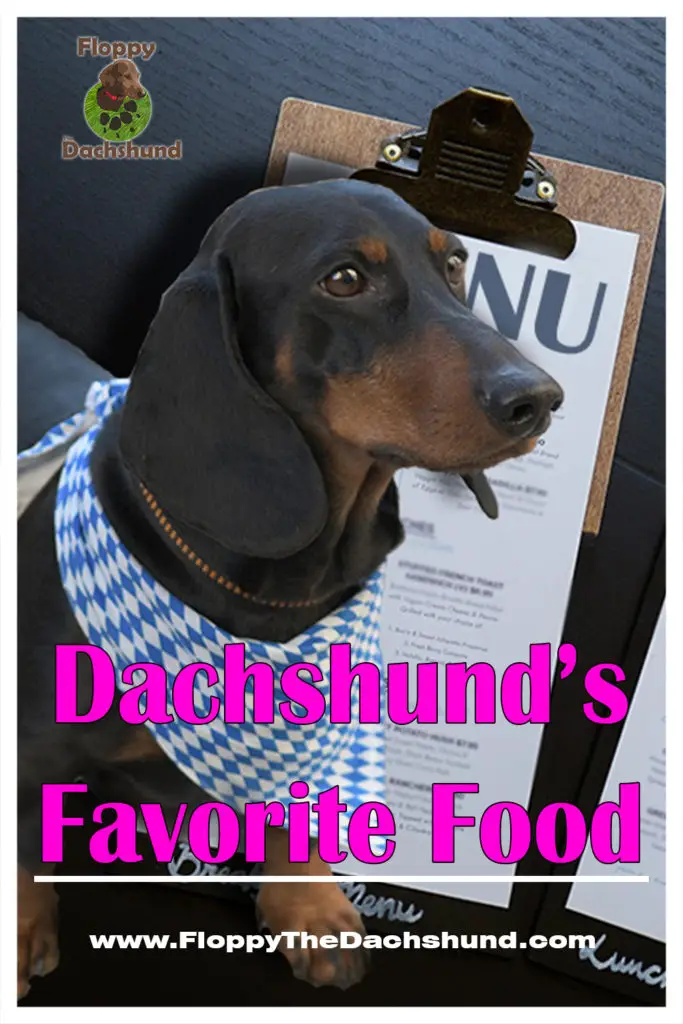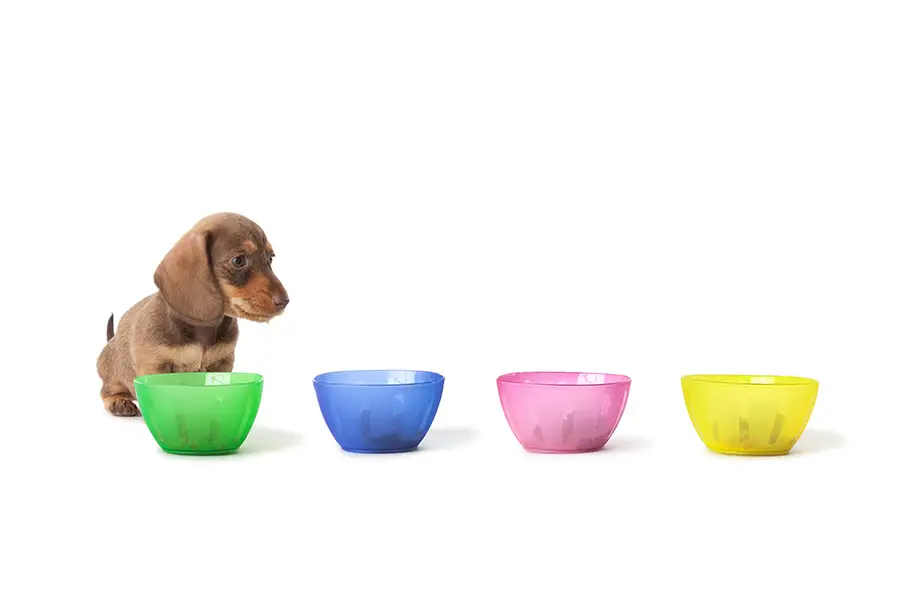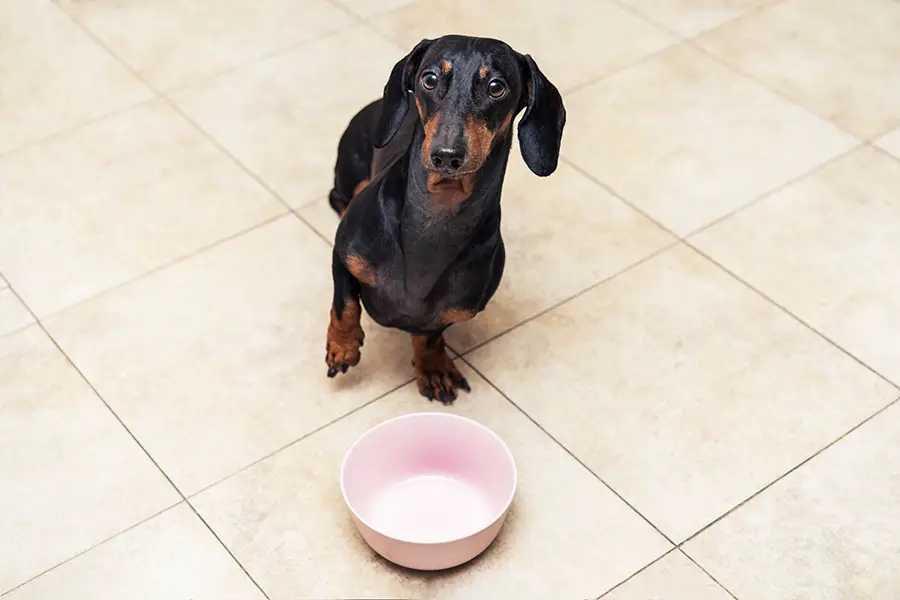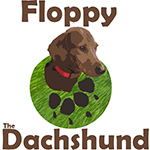I am a small-breed dog that has a long body, short legs, floppy ears and a friendly nature. I am an intelligent dog that was bred for hunting, so I tend to exhibit behaviors associated with that purpose. I have an inclination to bark and dig, though these behaviors could be controlled with training and a little patience. My breed has modest exercising needs and my short coat is easy to take care of and sheds less than that of many other breeds.
I originally come in two different sizes – the miniature and the standard. My miniature self is 5 to 6 inches tall and weighs 11 pounds, whereas my standard size is 8 to 9 inches in height and weighs anywhere from 16 to 32 pounds as an adult. Regardless of my size, providing me with a healthy, balanced diet is the easiest way to help me live a long and happy life.

A Dachshund’s Food Requirements
All dogs have the same nutritional needs, but there are some slight differences in my dietary requirements. I am a small-breed dog so I have a fast metabolism and the need for calories in my diet is high. I need a good amount of protein to maintain my lean muscle mass and to prevent me from getting obese. Animal protein and fat are good for me, although plant sources could be used in my diet to provide nutritional balance.
I don’t have a specific need for carbohydrates in my diet. Also, I have a limited ability to digest carbohydrates. Both of my sizes are at a great risk for allergies so my owner should avoid ingredients that might trigger allergies, such as grains. Grain-free carbohydrates like starchy vegetables, legumes or beans are an excellent source of nutrition and are also easy for me to digest.
Along with fats, proteins, and carbohydrates, beneficial supplements could also be added to my diet. Probiotics and prebiotic fibers help aid healthy digestion and chelated minerals provide me with essential minerals. Fresh fruits and vegetables could make up other important additions to my diet.
Special Dietary Considerations
With a lifespan of approximately 12 to 15 years, I am a fairly healthy breed. But I am prone to a number of health issues, including obesity, so my owner should keep a few things in mind to help make sure I reach my full lifespan.
Due to my long back, I am prone to back problems. Holding me the right way and including joint-supporting nutrients, such as glucosamine and chondroitin, in my diet can help me prevent them.
Allergies and obesity are two health problems related to my diet. In my case, common allergens are corn, beef, pork, wheat, chicken and soy, so my owner should avoid feeding me these ingredients, as well as low-quality fillers and artificial additives.
As is the case with all of dogs, I also require a special diet for maintaining a healthy weight. If you are thinking of bringing home a dachshund, the first thing you should do is visit a vet to discuss healthy food options for your new pet. Feeding me requires a lot of responsibility.
My owner will have to learn several new techniques for keeping me happy. My diet has a significant impact on my overall behavior and health, and this includes my nutritional requirements. The six essentials that I need are water, minerals, carbohydrates, protein, fats, and vitamins. These should all be a regular part of my diet.
When selecting food for me, you should make sure that it contains most of these essentials. In case you were thinking of buying me commercial dog food, remember that there is a large number of dog foods on the market and most brands claim that they are the best, making it difficult to choose one.
First, you should ensure that whatever dog food you buy is manufactured according to the standards of the AAFCO (the Association of American Feed Control Officials). Dog food that has been manufactured in accordance with the guidelines of the AAFCO is considered to be complete and balanced food, with all the necessary nutrients, and in the right amount. The next issue relates to ingredients. The general rule is that balanced and healthy dog food should be made up of 50% meat and 50% vegetables. Sometimes you might prefer a whole meat meal, since meat is high in protein.
When selecting a commercial meat meal, it is very important that you carefully read which meat has been used, either beef, lamb or poultry. You should also make sure that my food contains wheat, soy, and corn when selecting the right dog food for me. Vegetable meals are not whole meals for me. If possible, research a dog food that has been specifically formulated for the dachshund breed. For example, the Royal Canin Dachshund 28 and Eukanuba Breed Specific Dachshund Adult Dry Dog Food brands were created especially for me.
How Often Should A Dachshund Eat
Experts recommend that you feed me twice a day, once in the morning and again in the evening. However, dachshund puppies that are less than five months old may need to be fed three or four times a day, or according to the directions given by your vet.
Although most dogs become eager when their food bowl is placed on the floor, I could be a finicky eater, particularly during the first few days of being in a new home. In the beginning, I may be nervous about eating. If this is the case, you should teach me to eat on your schedule. For starters, you can try leaving the food bowl on the floor for 10 minutes and after that, pick it up. You should also take away the bowl even if I have not eaten the food. However, if I am a slow eater, you can extend the time to 20 minutes, but only if I am still eating and I have not gone away to look for some other entertainment.
At the next scheduled feeding, you should put the bowl back on the floor, but only 10 minutes. I will soon learn that I have to finish my food whenever it is offered to me. Regularly scheduled feedings also help establish a routine for me, and it also helps you monitor my health. If I am allowed to pick at my food the whole day, you’re less likely to notice immediately if I am not eating well. However, if I generally eat heartily whenever the food bowl is placed on the floor, you will be able to see immediately if I am lacking in appetite. In most cases, a lack of appetite would indicate that I am not feeling well. If my appetite does not improve within a few days, you should get me checked out by the vet.
Another advantage to set feeding is that a dog who eats according to a schedule also poops according to a schedule. Also if you live in an urban area, a bowl of kibble on the floor for the whole day can attract unwanted guests, like cockroaches and mice. Maintaining a regular feeding time has big advantages for everybody.
How Much to Feed Your Dachshund

The amount of feed that you give me varies based on my size and also on the type of food that I eat. However, puppies and young dogs burn more calories so they should be given a greater quantity of food and it should be high in fat and protein. Older and less active dogs need less calories so they can maintain a healthy weight. Keeping an eye on my weight is one way to monitor if I’m eating the right amount. Experts claim that you should be able to put your hands on my sides and feel my ribs easily. However, if you can’t feel them, then I am probably too heavy so consider feeding me less.
In case you are using commercial pet food, you should be aware of the feeding guidelines that can be found on the bag or box. These guidelines provide a list of different weights and the corresponding amount of food that should be given. However, these are only rough guidelines. A number of dogs are overweight because their families follow the directions on the label. Often these guidelines indicate portion sizes that are too big. It is a good idea to start feeding me the smallest recommended portion, then monitor me for hunger and body condition.
Different Portions For Different Dachshunds
Although it may appear to be counterintuitive, the general rule is that large breeds need less food and small breeds need more food per pound of bodyweight. Food requirements for individual dogs also vary in accordance with their level of activity, health, and age.
Puppies
Typically, puppies are introduced to solid food at 3 to 4 weeks and they are completely weaned from their mother’s milk by 8 weeks. Puppies need a diet that is high in protein and other nutrients that can support normal growth and development. If your puppy eats commercial pet food, you should select a brand that has been particularly formulated for puppies. Young puppies need to be fed at least three times a day – in the morning, afternoon, and early evening. Eventually, the food requirements per pound of bodyweight will start to level off as they grow.
When I reach 5 or 6 months, my feeding schedule can be reduced to twice a day. In case I am finicky, you can add some warm water to dry food to encourage me to eat. However, cow’s milk can act as a laxative, and it may result in digestive problems for some puppies, and even in some adult dogs. You should avoid giving it to me or only give it in small amounts. Furthermore, if I don’t eat all of my food in an hour, you should discard the uneaten portion.
The amount you feed me depends on my size, level of activity, environment, and metabolism. If you feed me too much, I may get pudgy and that can result in bone abnormalities or other health issues. If I am gaining too much weight, gradually decrease my food intake. If you’re not sure about what my proper weight or appearance should be, time to consult the vet.
Adults
At 1 year of age, I have reached full maturity and my nutritional requirements will remain the same throughout my young adult life, assuming that I’m not ill and not involved in extreme physical exercise. It is very important that my weight remains stable and that my body is well proportioned. I should have an observable waist and you should be able to feel my ribs with your fingertips, under a thin layer of fat.
If you are feeding me commercial pet food, you should select the brand that has been particularly formulated for adult dogs. Also, my appetite may vary from day to day. This is not a cause of concern unless I have lost my appetite for several days or if I have lost weight. However, a loss of appetite can be the first sign of several illnesses so you should monitor my food intake carefully.
You know me best so if something doesn’t seem right, don’t hesitate to take me to the vet.
Active Adults
Moderate exercise is essential for dogs. It helps us stay fit and trim throughout our life. Like some humans, there are certain dogs that regularly do more intense exercise. If your adult dog is particularly active (for example, if he runs or jogs with you or takes part in sports), his energy level will be higher compared to more sedentary dogs.
However, when an active dog becomes less active (for example, during cold winter months or when the dog has suffered an injury, such as a muscle pull or sprain), his food intake should decrease.
Furthermore, very active dogs should not be fed immediately before or after they have had an intense workout. This may result in digestive problems or discomfort, and can also increase the risk of gastric bloat, which is a painful and sometimes life-threatening condition where the stomach has become twisted. Your active dog may eat a small portion in the morning, but he should get most of his daily calories one hour or more after he’s had his last exercise session of the day.
To keep away hunger and fatigue, your active dog can also have small snacks or treats during periods of intense activity. It is also important for him to rest intermittently and to have access to fresh water at all times.
Senior Dachshunds
As with humans, the dietary needs of dogs also change as they age. Elderly dogs have less energy; as a result, they should not consume the same quantity of food as they did when they were younger.
If you give your senior dog commercial pet food, you should opt for brands that have fewer calories, but all the required nutrients. Dogs of any age should be fed in accordance with their overall health and level of activity and senior dogs are no exception. Remember, a less active dog will quickly gain weight.
What Kind Of Food For A Dachshund?

Dry Dog Food
Dry dog food has a very small amount of moisture. Its advantages are that it can be preserved for a long time and it doesn’t require refrigeration.
Canned Dog Food
I’m particularly fond of wet food. However, if you want to give me canned dog food, please make sure it is labeled “100% complete food.”
Semi-moist Dog Food
This type of dog food does not fulfill my nutritional requirements. It does come in fun shapes like hamburgers, pork chops, jerky, etc., but more importantly, semi-moist dog food is not a complete food.
Treats
You are free to give me healthy treats often, unless these treats contain preservatives. I love to be rewarded with foods like bananas, pumpkin, broccoli, cheese, watermelon, green beans, etc.
Commercial dog treats are convenient and can also help when training me. However, it is easy to forget to add these calories when you are calculating my daily food intake. It is a good idea to limit the overall number of treats that you give me, although raw vegetables like carrot pieces are a healthier and cheaper alternative to commercial treats.
Raw Diet
In general, a raw diet is healthy and it is also recommended by vets. However, raw meat can be problematic if it contains bacteria that can make me sick.
Organic Food
Organic food is free from fertilizers, pesticides, and antibiotics, and it is also completely acceptable for me to eat.
Home-cooked Food
Home-cooked food is a great option for me if it has been prepared after doing the proper research. However, home-cooked food can be time-consuming and expensive.
Pumpkin seed, soybean oil, sunflower oil, corn oil, arachidonic, gamma-linolenic and dihomo-gamma-linolenic, as well as non-essential fatty acids, are good for me. Likewise, fish, chicken, lamb, and beef are good sources of protein that should also be a part of my diet. Good sources of carbohydrates for me are cereals, wheat, corn, rice, oats, barley, and millet.
We are greedy little dogs, but overeating may result in weight gain. Excess weight can strain my long and relatively fragile my back, which can result in several health problems. Furthermore, if I am overweight, I can also face an increased risk for heart problems. My breed also has to watch out for dental issues as we have a tendency toward them, unfortunately.
As you know, I am a small breed and I don’t need a high-calorie diet. However, I also love food, and it is important that you don’t overfeed me so I don’t become obese. Adult dachshunds are not as active as puppies so my diet needs to be adjusted accordingly and I should be able to maintain a healthy weight.
Conclusion
In order to maintain a healthy weight, I should be given a healthy diet. You can also consult your vet to discuss which food would be healthy for me. Feeding me is a job full of responsibility and you might have to learn several new things to keep me happy when it comes to food.
To check the best products available on the market today, see my post here.
See Also My Other Related Posts:
Don't Forget To Make Your Dachshund Happy And Check Out Dachshund Favorite Products!
In my article, I reveal all the information about Dachshund’s Favorite Food. The best dachshund food available on the market: Most Nutritious And Delicious Dachshund Food Products Available On The Market
If you want to learn what are the latest trends in Dachshund fashion check my article: Dachshund’s Fashion. How to choose the dachshund clothes that just simply fit: Finding the Right Clothes for Your Dachshund
If you want to prepare your beloved Dachshund for cold weather check out my article: Jackets And Outdoor Gears For Dachshund.
To go out with your dachshund, but not choke him to death check out my article about harnesses: Finding The Best Harness for Dachshund When you are ready to get one check the options available on the market Choosing The Right Harness For Your Dachshund

